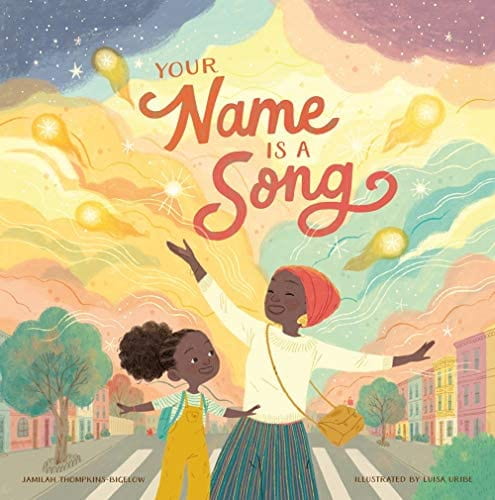Written by Jamilah Thompkins-Bigelow & illustrated by Luisa Uribe Reviewed by Sofia Puorro
When asked whether she was bothered by the constant and deliberate mispronunciation of her name, vice-president Kamala Harris responded that a name is the first gift children receive from their families. In Your Name is a Song, Jamilah Thompkins-Bigelow uses rhythm and melody to capture that precious quality Harris refers to. In this playful and powerful book about the first day of school, a parent and child explore the wondrous variety of names.
The narrative tells of a young child whose name gets mispronounced and teased on the first day of school-by teachers and students alike. On the walk home, she dejectedly recounts the events of the day to her mother who, without missing a beat, finds beauty in every situation. She lovingly tells her child that every name should be cherished like its own song and they walk through the city streets together, joyfully singing names. The book provides pronunciation guides within the text and a glossary in the back for the reader’s reference. In addition, the publishing company has provided a video of the author pronouncing each name that appears in the book.
This picture book could be shared with all ages, but I think it is particularly suited for the primary grades. The nerves of the first day of school are relatable to most children, but it’s important to discuss the added layer of anxiety for children of marginalized identities. For younger students who may still be grasping the concept of marginalization, this is a good entry point for them to learn about micro-aggressions that happen on a daily basis, even in school and even by teachers. In addition, it can serve as a tool for children who experience these micro-aggressions. It’s incredible to read a book in which insults are turned immediately into celebrations and without pause or rumination, a parent guides her child in advocating for herself. This kind of self-advocacy is something that should be more common in children’s books, especially those that serve as mirrors to underrepresented identities.
I recommend adding this book to your classroom library, especially if you are a K-1 teacher. A word of advice: be sure to practice the names carefully before doing a read-aloud and if you feel incapable of pronouncing the names, try to find a trustworthy recording of a read-aloud. This book lends itself well to a musical-identity activity and reading it aloud could be a lovely segue into learning the proper pronunciation of your students’ names.
